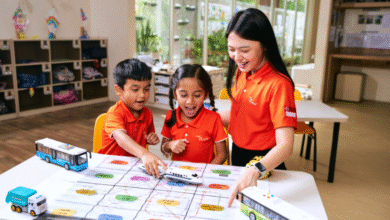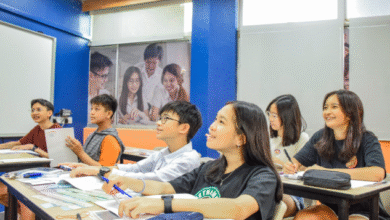Shaping Global Learners Through Holistic Education

Introduction
Education is undergoing a transformation worldwide, with more emphasis on developing skills that go beyond academic excellence. Parents today want their children to gain not only knowledge but also values such as empathy, global understanding, and independent thinking. In Hong Kong, international schools have become pioneers in offering globally recognized and well-structured learning systems. The ib curriculum hong kong has emerged as one of the most comprehensive approaches, promoting both intellectual and personal growth through a balanced, inquiry-based framework.
Understanding the IB Curriculum
The International Baccalaureate (IB) curriculum is an internationally acclaimed education system designed to cultivate critical thinkers and lifelong learners. It is divided into four main programs: the Primary Years Programme (PYP), Middle Years Programme (MYP), Diploma Programme (DP), and Career-related Programme (CP). Each stage focuses on age-appropriate learning objectives, encouraging creativity, communication, and collaboration. The ib curriculum hong kong integrates global perspectives with local relevance, helping students become confident individuals ready to contribute to a diverse world.
See also: The Ultimate Guide to Choosing the Best Tuition Centre in Singapore for PSLE.
Core Philosophy and Educational Approach
At the heart of the IB philosophy lies the belief that education should nurture the whole child—academically, emotionally, and socially. The curriculum encourages curiosity and independent inquiry, where students learn through questioning and exploration rather than memorization. Teachers act as facilitators, guiding students to think critically, evaluate information, and make informed decisions. This learner-centered approach ensures that education remains dynamic, relevant, and engaging for students of all backgrounds.
Focus on Global Awareness
One of the defining features of the ib curriculum hong kong is its commitment to fostering international-mindedness. Students explore global issues such as sustainability, ethics, technology, and cultural diversity. They learn to appreciate different viewpoints and develop respect for other cultures, preparing them to become responsible global citizens. The curriculum’s international outlook makes it ideal for students in Hong Kong, a city known for its multicultural environment and global connectivity.
Academic Structure and Subject Choices
The IB curriculum offers a flexible yet challenging academic structure. Students engage in six subject groups, covering languages, social studies, sciences, mathematics, and the arts. They are required to study a combination of higher-level and standard-level subjects, ensuring both depth and breadth of knowledge. The ib curriculum hong kong encourages students to make connections across disciplines through a holistic framework that includes theory of knowledge (TOK), creativity, activity, and service (CAS), and the extended essay (EE). These core elements develop analytical thinking, research abilities, and a sense of social responsibility.
Skill Development and Practical Learning
Unlike traditional education systems, the IB focuses on skill-based learning. Through group projects, experiments, and independent research, students develop practical abilities such as leadership, communication, and collaboration. The CAS component, in particular, allows students to participate in community service and extracurricular activities that build empathy and teamwork. This experiential learning model helps them apply academic concepts to real-world situations, creating a balance between theory and practice.
Role of Educators and Learning Environment
Teachers in Hong Kong’s IB schools are trained to deliver lessons that encourage exploration and creativity. They use innovative teaching strategies, such as project-based learning and open discussions, to inspire curiosity. The classrooms are interactive spaces equipped with modern technology and resources that promote engagement. The ib curriculum hong kong emphasizes teacher-student collaboration, ensuring that learning remains personalized and supportive. This approach builds confidence and independence among students, empowering them to take ownership of their education.
Benefits for Higher Education and Beyond
One of the most appealing aspects of the IB curriculum is its global recognition by universities and employers. Graduates of the ib curriculum hong kong are known for their ability to think critically, manage time effectively, and conduct independent research. The extended essay component mirrors the academic rigor of university-level work, giving students an early advantage. As a result, IB graduates are well-prepared to succeed in higher education and adapt to the challenges of the modern professional world.
Encouraging Creativity and Innovation
In addition to academic rigor, the IB places strong emphasis on creativity and innovation. Through subjects like design technology, visual arts, and digital media, students are encouraged to express their ideas and explore new solutions. The curriculum provides opportunities for experimentation, helping learners understand that creativity is not limited to the arts but extends to science, technology, and problem-solving. This mindset cultivates innovators who are ready to address complex challenges in society.
Parental Involvement and Community Engagement
Parental support plays an essential role in the success of IB students. Schools offering the ib curriculum hong kong maintain open communication with parents through regular meetings, workshops, and progress reports. This partnership ensures that parents are actively involved in their child’s academic and emotional growth. Community projects and service initiatives also strengthen the connection between students and society, promoting empathy and civic responsibility.
Adapting to a Changing World
As technology and globalization continue to shape the world, education systems must evolve accordingly. The ib curriculum hong kong prepares students for this transformation by teaching adaptability, cultural intelligence, and resilience. Students are encouraged to view challenges as opportunities to learn and grow. The emphasis on lifelong learning ensures that graduates remain open to new ideas and capable of thriving in uncertain environments.
Conclusion
The ib curriculum hong kong represents a forward-thinking approach to education that blends academic excellence with emotional intelligence and global awareness. Its unique structure fosters creativity, independence, and social responsibility, equipping students with the skills needed for success in a rapidly changing world. By embracing inquiry, collaboration, and community involvement, the IB curriculum not only prepares learners for university but also molds them into compassionate global citizens. For families seeking a meaningful and comprehensive education, this curriculum offers the perfect balance between knowledge and character development.




